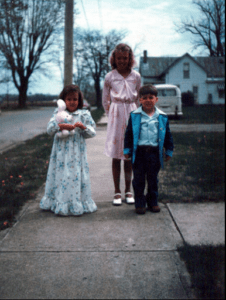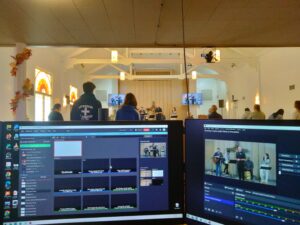Why I Do What I Do
Most Christians rely on the churches they attend to teach them all they need to know about being a Christian. Even with all of the podcasts, YouTube channels, and books available these days, people still depend on their local church to tell them about who Jesus was and how they should live their lives.
My whole churchgoing experience has been spent in small churches. I grew up attending a small mainline denomination church whose attendance was usually around 60-80 people. My hometown is a small farming community in central Ohio with a population right around 1000. Most of our congregants were farmers, mechanics, teachers, nurses, and construction workers. My dad was a carpenter and my mom was a teller at a bank. It was (and still is) a real blue-collar crowd. Statistics show that this is the normal experience for most churches throughout America.

My cousins and I heading to Easter Sunday. I’m the one in the pinp suit
The church I attend now is pretty similar in makeup – even though I now live in one of the largest cities in the world. It’s a small church of about 45 regular attendees. The crowd in my current church is similar to the crowd in my hometown church – mechanics, educators, office workers, a few IT people, etc. No farmers, though.

My view these days.
We had a very active Sunday school program when I was growing up. There were classes for every grade level – from infant to adult. The church only had one person in the education area who had any theological training and that was the pastor. And the only teaching he did was his Sunday sermons. Sunday school classes consisted of materials the church bought, handed to the teacher, and said, “Here, just read this and talk about it”. Or, in the case of the little ones, “Here, just color this”. This is exactly what would happen in the high school class. Our Sunday lessons consisted of us reading little booklets together in class about various situations kids our age may find themselves in. We’d talk about what we had read and how we should handle the given situation. Then, we would toss the booklets in the trash on our way out the door. I don’t remember ever cracking open my Bible after it was given to me in the 3rd grade class.
I left the church when I turned 18 and moved away to college. I’m pretty sure if I took the surveys we talked about last time – on what Christians believe – I would have fallen in with the culturally Christian crowd. I would have called myself a Christian because that’s what I grew up in. I believed that some higher power existed, but I thought the Bible was made up by men, that Jesus was just a wise teacher, that we could figure out how to be good people if we just worked hard enough at it, that if we would just be nice to each other we would end up in a really nice place when we died, and who cares who you sleep with or how yo act as long as you love each other. I would have been in the “rarely attend church” crowd. And, as for the Bible, I would have also been in the “never read it in my life” group.
My coming to know Christ didn’t happen because someone dragged me off to church. And, it didn’t happen because someone witnessed to me or I heard someone’s testimony. I came to know Jesus primarily on my own. Of course, there were other people involved in the process. But for me, I began exploring Christianity on my own because of some things I had seen in the culture, some things I had heard people say, and some things going on at home. This prompted me to start reading on my own, watching YouTube videos of Christian thinkers on my own, and listening to podcasts on my own. It was my self-education that led me to Christ and not something any local church did for me. Nobody has me pray the sinner’s prayer. There was no alter call for me. And nobody asked me to accept Jesus as my Lord and Savior. I gave my life to Christ months before ever stepping foot into a church.
As soon as I started to see the breadth and depth of the Christian worldview, I was more than a little bothered about my earlier church experiences. I had been struggling for quite a while to make sense of the world. And what really made me start following Jesus was how he made sense of it all over 2000 years ago. Why did this bother me? Because one of my first reactions was, “Why didn’t anyone tell me this stuff?” Why didn’t the pastors or the Sunday School teachers teach me this? Rather than sermon after sermon – and lesson after lesson – of “be nice to other people”. If only those people had told me more about who God is, why I should trust the Bible, and why Jesus died on the cross in the first place, I might never have walked away from God.
Now, I admit that when I was 18, I was pretty stubborn, somewhat rebellious, and thought I knew everything I needed to know about how the world worked. So, chances are, I might have walked away no matter how full my Christian education was growing up. But, maybe not. Who knows?
Where Do We Go To Learn?
Even though we have a smorgasbord of choices here in Los Angeles – with churches from 5 to 5000 – we ended up in a small church of about 50. And, the education was a bit worse there than in the church I grew up in. When I started attending, there was no adult Sunday school class or book studies at all. The kids would be dismissed from the worship service to go to their classes, but that was the extent of the teaching other than the sermon. There was nothing for the adults.
At this point, I was about a year into my deep dive into apologetics, theology, and philosophy. I had never really observed the office of the pastor up close and personal before. I had only seen pastors on TV and in person when I was a teenager. Because I now knew how much there was to learn about Christianity, I realized there was no way a pastor could cover all of it in 40 minutes once a week. Think about how well you would have done in science or history or math if you only took one class a week for 40 minutes. Would you be able to pass the final at the end of the year? It was wrong of me to blame my previous pastors for not telling me all I needed to know when I was only dedicating 40 minutes a week to understanding my worldview.
For the average Christian, the next line of education would be Sunday School and/or small groups. Earlier, I was critical of the Sunday school lessons I was taught as a kid. Then, I started to think about who my Sunday school teachers were. All of the teachers were the farmers, nurses, and bank tellers mentioned earlier. These are working people with families and busy lives outside of the church. They barely have time to get dinner on the table and run their kids around to sporting events and recitals. They don’t have a lot of time to devote to theological studies. The teacher we had in the high school class worked for the Department of Transportation on a road paving crew during the week. He hadn’t been to Bible college. Or read a theological textbook. He was a volunteer who had a job and a family.
The congregation of the church I attend now is like this, too. And so are the vast number of churches across the US. The huge churches we see on TV are the minority. Most churches are under 100, they have one pastor (who often has a second job), and they are run primarily by volunteers. There is no one on staff to shepherd the congregation in the things it needs to know to be effective disciples.
IT Professional + Something To Say = Website Time!
Right about the time we joined our church, I decided to start writing down all of the things I was learning. And, this site was born. I felt like other people probably had the same questions I did, and maybe they would find my articles useful. My approach in the beginning was pretty random – I wrote whatever I felt like and hoped something would catch. Eventually, a pattern emerged on topics I enjoyed covering the most – making the case for the reliability of the Bible, showing how to interpret Scripture, and how to have conversations about what you believe.
Over time, my audience emerged, too. When you first get into apologetics you think, “Everyone needs to hear this! If only they see this evidence or hear this flawless argument, they’ll be saved”. Over time, though, I realized there was more to this than showing the evidence or making a good case. Many people will still deny truth claims regardless of the evidence. No, my audience wasn’t everybody. It was one type of person, really.
My audience is me.
Now, by “me” I don’t mean just me. If I were only doing this for myself, I wouldn’t bother with all the work it takes to manage a website. I’d just keep it to myself on my computer. What I mean by “me” is people like me. Growing up, I wasn’t given a solid foundation for why I should believe that Christianity is true. I didn’t find myself surrounded by teachers who were well-equipped to cover foundational topics. And, I’m not pointing fingers at former pastors or Sunday school teachers, either. Instead, they are also my audience. The content I create should be useful to the Sunday school teacher who wants to do an introductory lesson on a given topic. Or have some basis for group discussion in their class on core doctrine, issues of the day, or challenges Christians may encounter in their daily lives.
My work isn’t scholarly in the stricter sense of the word. I’m not writing for academia. The content I create is designed to equip regular Christians – people with jobs, families, and other commitments – to fulfill two specific mandates. First, we must all be ready to give reasons for why we believe what we believe (1 Peter 3:15). And, second we need to make more disciples of Jesus (Matthew 28:19-20). “Make disciples” doesn’t just mean evangelizing. The goal isn’t to get a person to say the sinner’s prayer and then move on to the next one. A disciple is also a learner, a follower, and an emulator of the one whose disciple they are.
Equipping Ambassadors
Last year, I had someone close to me ask if we could do a Bible study together. I knew this person had already done a lot of Bible studies, but they probably hadn’t been trained in doctrine. They hadn’t heard the arguments for why Christianity is true. Nor were they familiar with all of the evidence. So, I wrote up lessons for us to go through once a week on core doctrine, arguments for God, reasons why we should trust the Bible – all of the stuff I have been writing about here. As we were going through the lessons, in the back of my mind I was thinking “I really ought to publish these so other people can get some use out of them”. And, Ambassador Training was born.
Seeing the surveys I discussed recently confirmed what I had already been sensing – that Christians were lacking a lot of the foundational knowledge on what Christians believe and why they should believe it. It would be easy to take a scolding tone, wag my finger, and say, “Shame on you. You ought to know these things”. But, I get it. Life is busy. And, we don’t all have time to pour through theological tomes or hours of lectures to learn all we need to know. Nor do the volunteers teaching Sunday school or leading small groups have the time to prepare in-depth lessons that cover these essentials.
Over the next several months, I will be releasing the lessons that I have developed through the class I’ve been teaching. The class is essentially a study of systematic theology (meaning what the whole Bible has to say on a given topic) mixed with apologetics and philosophy. Each lesson will consist of a short video, a written article, and a downloadable slide presentation.
Don’t be turned off by terms like systematic theology or philosophy. These won’t be dry, hour-long lectures like you may have sat through in school. Remember who I said my audience was; people who are looking to have their questions answered, people who are looking to go a little deeper into what they’ve been hearing or reading, people who have lives and jobs and families. These lessons are meant to introduce the various topics and hopefully encourage you to dig a little deeper on your own.
Why I Do What I Do
Why do I do what I do? Because I know the impact studying these topics has had on my life – how it has brought me clarity when the world seems crazy, comfort when I am at my weakest, and hope when things seem hopeless. I do what I do so that busy fathers and business owners like my friend Isaac can get their questions answered without being overwhelmed by all the scholarly work in these areas. I do what I do so that people who are focused on connecting with youth – like my friend Nichole – can have substantive material to teach and discuss in her youth groups that get teenagers into a closer relationship with God. And I do it for people like my friend, Adam, who already knows this stuff but doesn’t have time to pull together resources for the classes he leads.
Why do I do what I do? Because I want to see the 6% of Christians who are living a Biblically consistent worldview move closer to 100%. If the church is Christ’s bride, and he is the bridegroom, the bride isn’t presentable today. And I hope to change that.
So, if you have questions, if you want to go deeper in your knowledge of God, if you would like to have resources to help you study these topics with others, if you want to build a strong foundation that will withstand the challenges you are facing, then please sign up for the newsletter so you won’t miss out when they are released.
I’m excited to share these lessons with you. And, I hope you are equally as excited to dig in and become a better equipped Ambassador for Christ.
Share This Story, Choose Your Platform!
latest video
news via inbox
Nulla turp dis cursus. Integer liberos euismod pretium faucibua








Love the information
Thanks, J!
Many Christians rely on their local churches for learning about their faith, especially in smaller churches where there aren’t many resources. However, some churches lack deep teaching, which can make it hard for people to understand their beliefs fully. Your personal journey of discovering Christ shows how important it is to seek knowledge on your own, and your efforts to create helpful resources for busy people demonstrate your desire to help others grow in their faith.
Hi Sarine,
I definitely have a passion to help the busy, regular folk. I hope you find the articles and materials here on the site helpful.
this is really good information i feel that Christ will always lead us in the right direction and teaches us good lessons.
Hi Lyla,
Yes, He will. The part part is being patient ;)